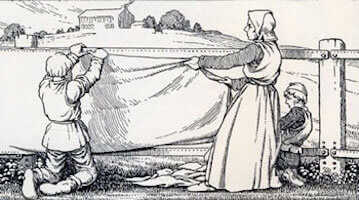Tenterhooks?
Q.
We’ve been waiting on them for centuries now, but what exactly are tenterhooks?
.
A.
Thankfully, they are not as grisly as one might imagine. For those who haven’t heard the phrase, being ‘on tenterhooks’ means that you’re on edge, nervous, waiting painfully to find something out, or to see what will happen.
With such a well-worn phrase, we’ll turn to the Paisley UK born, ever influential James Main Dixon, who lived from 1856 to 1933. In his 1891 Dictionary of Idiomatic Phrases, JM Dixon writes: ‘on tenterhooks – in a state of discomfort or agony. Tenterhooks are the hooks on which a web of cloth is stretched by the selvages on a frame.’
Said frame was called a ‘tenter’ – a word and concept closely related to that of a tent. The ‘on tenterhooks’ idiom stems from the idea that one is being helplessly and painfully held in an awkward position – by sharp metal hooks, no less – hoping for sweet release. Cloth-makers subjected their wet woollen goods to this tenterhooking in order to avoid shrinkage.
Dictionary creator Dixon offers an example of the tenterhook phrase from Florence Marryat, author of dozens of books including the 1897 Blood of a Vampire. ‘I must say I should like to have it settled as soon as possible, because it keeps a man on tenterhooks, you know, and feeling like a fool’.
And, 119 years later, we see the phrase in Ruth Ware’s: The Woman in Cabin 10. ‘He was openly grinning now, not even trying to hide his disbelief. “It’s like something out of a novel.” Was he deliberately trying to undermine my account, throw me off-balance? Or was this just his normal manner? I couldn’t tell. “Go on,” he said with something close to sarcasm. “I’m on tenterhooks to find out how this turns out.”
.
.
.www.justcurious.ca
Header Image: Jaime Dantas









